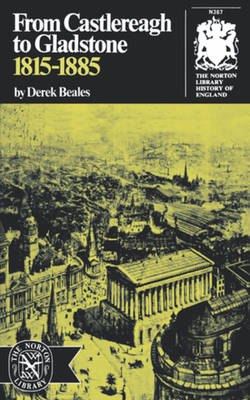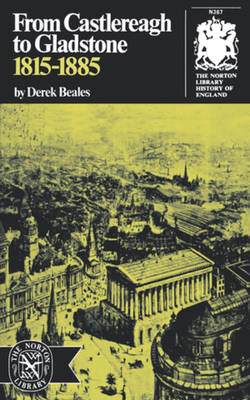
- Afhalen na 1 uur in een winkel met voorraad
- Gratis thuislevering in België vanaf € 30
- Ruim aanbod met 7 miljoen producten
- Afhalen na 1 uur in een winkel met voorraad
- Gratis thuislevering in België vanaf € 30
- Ruim aanbod met 7 miljoen producten
Omschrijving
With the defeat of Napoleon at Waterloo in 1815, Britain was again pre-eminent among the great powers, and was to remain so for the next seventy years. Her colonial empire was far more extensive than that of any other country; London was the financial capital of the world; she had the largest navy and mercantile marine, the chief share of the world's trade, the highest manufacturing production, and the most progressive agriculture. From Castlereagh to Gladstone is a fresh and stimulating appraisal of this brilliant period in Britain's history.
The age was characterized by an unprecedented rate of change and by extraordinary achievements both at home and abroad. Major legislative and institutional changes such as the three Reform Bills, the establishment of trade unions, and the Education Act of 1870 were enacted. Industrialization and urbanization advanced rapidly. It was a period of remarkable statesmen: Melbourne, Canning, Peel, Lord John Russell, Palmerston, and Benjamin Disraeli.
In each of the four sections of the book, Professor Beales presents a succinct narrative of events followed by discussion of particular topics, so that each aspect of the period is set within a clear narrative framework. He traces the main cultural trends and gives comprehensive coverage to all major economic, social, and political developments, providing a balanced survey of events in nineteenth-century Britain and the forces, people, and ideas that shaped them.
Specificaties
Betrokkenen
- Auteur(s):
- Uitgeverij:
Inhoud
- Aantal bladzijden:
- 352
- Taal:
- Engels
- Reeks:
Eigenschappen
- Productcode (EAN):
- 9780393003673
- Verschijningsdatum:
- 1/11/1969
- Uitvoering:
- Paperback
- Formaat:
- Trade paperback (VS)
- Afmetingen:
- 130 mm x 196 mm
- Gewicht:
- 312 g

Alleen bij Standaard Boekhandel
Beoordelingen
We publiceren alleen reviews die voldoen aan de voorwaarden voor reviews. Bekijk onze voorwaarden voor reviews.











